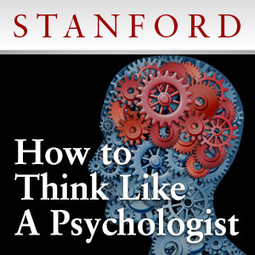 In early January, we brought you a set of 15 tips to help you stick to your New Year’s resolutions, straight from The Willpower Instinct, a bestselling book by Dr. Kelly McGonigal. Today, we’re highlighting a course that McGonigal organized for Stanford’s Continuing Studies Program, entitled How To Think Like a Psychologist. The premise is simple: McGonigal introduces prominent Stanford psychologists, who proceed to discuss their research and explain precisely why their field happens to be so fascinating, after which McGonigal leads a short discussion with the guest. An audience Q&A session follows.
In early January, we brought you a set of 15 tips to help you stick to your New Year’s resolutions, straight from The Willpower Instinct, a bestselling book by Dr. Kelly McGonigal. Today, we’re highlighting a course that McGonigal organized for Stanford’s Continuing Studies Program, entitled How To Think Like a Psychologist. The premise is simple: McGonigal introduces prominent Stanford psychologists, who proceed to discuss their research and explain precisely why their field happens to be so fascinating, after which McGonigal leads a short discussion with the guest. An audience Q&A session follows.
Each of the course’s six lectures is a neatly packaged primer on a researcher’s area of expertise: Greg Walton gives a detailed talk about his work on academic stigma, and the role it plays in the achievement gap so evident in American education, while in later lectures, James Gross discusses his research on emotional regulation, and Bridget Martin Hard explains the benefits of studying animals to better understand humans. The strength of the course lies both in its accessibility, and its level of depth: one does not need a background in science to learn something tangible about current psychological research. What’s more, one gets a sense of how relevant psychology is as a practical science, governing every fleeting thought and social interaction.
How To Think Like a Psychologist is currently available on iTunesU. You can find it listed in our collection of Free Online Psychology Courses, part of our collection, 4,000+ Free Movies Online: Great Classics, Indies, Noir, Westerns, Documentaries & More.
Ilia Blinderman is a Montreal-based culture and science writer. Follow him at @iliablinderman, or read more of his writing at the Huffington Post.
Related Content:
The Power of Empathy: A Quick Animated Lesson That Can Make You a Better Person
Jacques Lacan’s Confrontation with a Young Rebel: Classic Moment, 1972
New Animation Explains Sherry Turkle’s Theories on Why Social Media Makes Us Lonely


Leave a Reply